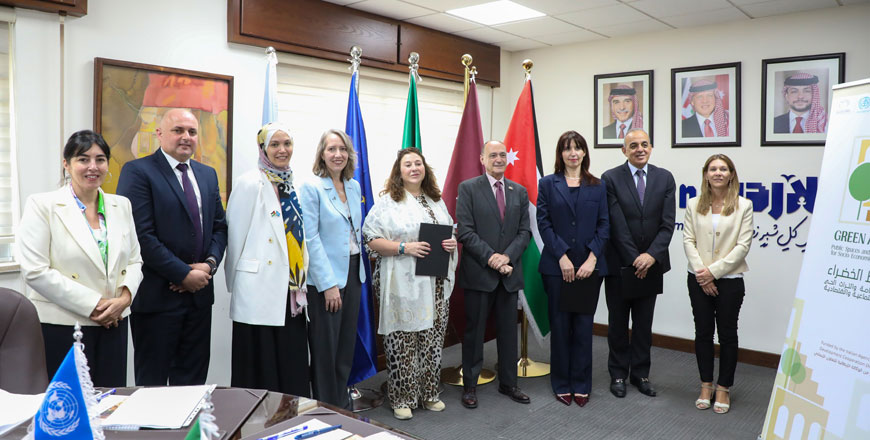AMMAN — The Italian government and UN-Habitat signed a 2.5 million euro agreement to implement the “Green Salt: Public Spaces and Living Heritage for Socio-Economic Development” initiative.
The agreement was signed at the presence of the secretary-general of the Ministry of Tourism and Antiquities, Emad Hijazeen, the Italian ambassador to Jordan, UN resident coordinator, representative for the UN-Habitat Regional Office for Arab States, as well as representatives from UNESCO and Greater Salt Municipality.
This initiative reaffirms the UN and Italy’s dedication to preserve Jordan’s historical and cultural legacy and ensuring the valorisation of living heritage assets, according to a statement for The Jordan Times.
This signing ceremony marked the beginning of collaborative and coordinated efforts between UN-Habitat, UNESCO, the Ministry of Tourism and Antiquities, the Ministry of Culture, and the Greater Salt Municipality. Funded by Italy through the Italian Agency for Development Cooperation, this initiative aims to preserve the integrity of Salt City and enhance the well-being and quality of life for its residents, through the revitalisation of public spaces, the statement said.
This project emerged following Salt city’s inscription as a UNESCO World Heritage Site, naming it “The Place of Tolerance and Urban Hospitality”. Over centuries, Salt has welcomed diverse communities, its dense urban fabric fostering a legacy of tolerance and coexistence. However, the city’s public spaces, essential for promoting social cohesion, face numerous challenges as the city grows, and the importance of maintaining these public spaces is critical to preserving the integrity and social fabric of this historically and culturally significant city.
The implementation of the initiative will strategically combine the expertise of UN-Habitat and UNESCO, with key objectives being the development of a city-wide public space strategy, the rehabilitation of safe, inclusive, and accessible green public spaces, as well as the documentation, promotion, and valorisation of living heritage assets within Salt Municipality. The project will encourage the active participation of the community in all phases, ensuring their voices and needs are integrated in the planning and implementation processes, the statement said.
Hijazeen, said, “We value our partnership with our friends in Italy and the UN, which has proven over the years its importance to our efforts in preserving, restoring, and presenting our divers and rich heritage. This project is one of many we have signed with the Italian government and the United Nations, but it certainly isn’t the last. Jordan’s efforts to enlist sites on the UNESCO World Heritage List is only the first step, the result of which is to support the local communities and Jordanians in general, enforce sustainability and most of all preserve our heritage for future generations”.
“In addition to ensuring the valorisation of urban settings of cultural and historical interest, this initiative sheds light on the design of city spaces and their role in facilitating or limiting opportunities for social cohesion,” emphasised by the Italian ambassador to Jordan, Luciano Pezzotti.
“This project underscores the UN’s commitment to assisting Jordan in achieving its international commitments and national priorities.
By responding to the Salt Conservation Management Plan, we aim to conserve and repair the city’s spaces and living heritage assets, maintaining its hospitable urban fabric.
